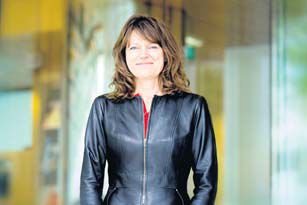By Suzanne Koelega.
Convinced that children in Bonaire, St. Eustatius and Saba deserve the proper attention and that the rights of this group have to be safeguarded, Dutch Children’s Ombudsman Margrite Kalverboer will draft a report in the near future on how to best serve the interests of children in the Caribbean Netherlands.

Kalverboer hopes to have the report ready by March 2017. “The report will serve as a guideline of what we have to do as an institute. As the Dutch Children’s Ombudsman, I also have a task on the islands and it is my intention to give content to that,” she told The Daily Herald on Tuesday.
The report will be largely based on the talks that the Children’s Ombudsman had with a large number of children during her visit to the three islands in November this year, as well as the some 250 questionnaires that children have completed.
The majority of these completed questionnaires came from Bonaire, and because Kalverboer would love to have more input from St. Eustatius and Saba, she urged the children from these two islands to fill in the questionnaire which is still available on the website www.kinderombudsman.nl.
It is important to gather as much information as possible so the Children’s Ombudsman can get a comprehensive overview of the situation of children’s rights, how children live on the islands, and how to make things better for this vulnerable group of about 5,500. “The report will be based upon what the children tell us, which things are going well and what things they want to see improved,” said Kalverboer.
The working visits to the schools in the Caribbean Netherlands and the talks with the children gave a mixed view, said Kalverboer. In Bonaire, some youngsters were not happy at school especially at the vocational level where there are problems with bullying and drugs. Some children in Bonaire said they had trouble getting to school because there were no school buses and their parents could not always take them to school.
Many children in the Caribbean Netherlands said that there was little to do for them in their free time. “Saba is so small that it sometimes feels oppressive for children. Their world is very small and they cannot easily get off the island. Sometimes these children lack a challenge, perspective, and this made them seem a bit lethargic,” said Kalverboer.
The Children’s Ombudsman was more positive about St. Eustatius where she said children were doing relative well. “Children are working on their talents. They want to do more with that, and that is very positive,” she said.
In St. Eustatius, children also said that they would like to have safer roads so that they could ride a bicycle. Kalverboer said she had taken note of the large potency in St. Eustatius and the island’s rich cultural and historic heritage.
What struck Kalverboer was that many children on the three islands were not eating healthy. Some children indicated that they only ate fruits once a month. The children said they would love to eat more fruits and vegetables. Obesity is a serious problem. Kalverboer visited supermarkets and was shocked by the high prices which she called “bizarre.”
Children further stated that their parents had little time for them. This is the same complaint of children in the Netherlands, said Kalverboer, who on Tuesday presented the results of her children’s rights tour throughout the Netherlands including the Caribbean Netherlands. In the Netherlands, the majority of the children considered the high work stress at school to be a big problem.
Also presented on Tuesday was the fifth Children’s Rights Monitor which defined 10 points of concern ranging from the access to youth assistance and education for a specific group of children to the combating of poverty and the tendency to listen too little to what children have to say.
Children in the Caribbean Netherlands also said they found it difficult to address their issues in an anonymous manner because everybody knows each other on these small islands. Children indicated that they would feel more at ease to discuss their problems with someone from another island who understood their culture, but who was more at a distance of their community.
Poverty was not a subject that children spoke openly about. They said that they knew of other children who were poor. Yet, in the questionnaires that were filled out some 25 per cent of the children indicated that they did not always get enough to eat and drink. Teachers could relate to this problem and acknowledged that indeed children came to school without a breakfast. In some schools, a breakfast is provided to alleviate this problem.
Statia student Sjerees Timber was one of the invited guests at the presentation of the children’s rights tour and the Children’s Right Monitor in The Hague on Tuesday. She told the audience, which largely consisted of youngsters, about growing up on a small island where everyone knew each other and where the prices were every high.
Dutch State Secretary of Social Affairs and Labour Jetta Klijnsma who was also invited to share her views specifically mentioned the Caribbean Netherlands. “We should not forget our children on the islands for they are part of the Netherlands too,” she said.
Klijnsma praised the Mega D initiative in St. Eustatius. “I am very impressed with Mega D. All children are always welcome to take part of the activities that he and his volunteers organise to help develop the talents of these children. He knows the children and knows what they need,” she said.
Organisations such as Mega D have her support, said Klijnsma, who explained that an additional one million euros has been made available in the Dutch budget to help combat poverty and to directly assist children on the islands. Dutch National Ombudsman Reinier van Zutphen was present at Tuesday’s well attended event.
The Daily Herald.
 Archive of posts from Saba-News.com Archive Saba News
Archive of posts from Saba-News.com Archive Saba News